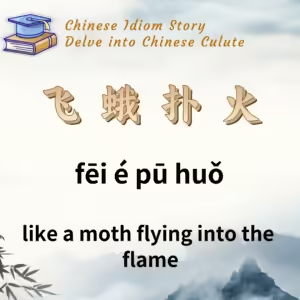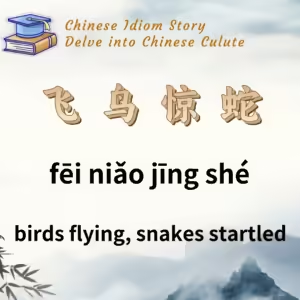
Chinese Idiom: 飞蛾扑火 (Fei E Pu Huo)
English Translation: Like a moth flying into the flame
pīn yīn: fēi é pū huǒ
Idiom Meaning: This idiom is used to describe someone who recklessly seeks their own destruction. “飞蛾” (fēi é) refers to moths, which are insects that are often active at night and attracted to light. “扑” (pū) means to dash towards something.
Historical Source: “Liang Shu · Dao Gai Zhuan” (Book of Liang · Biography of Dao Gai).
Idiom Story
Dao Gai was a person from the Liang Dynasty. His grandson, Dao Yin, was highly intelligent and diligent, showing talent in poetry and literature from a young age. Once, Emperor Wu of Liang, Xiao Yan, saw the poems and essays written by Dao Yin and praised him greatly. The emperor playfully remarked to Dao Gai, “Yin is certainly a talented individual, perhaps you have always relied on his literary skills!”
After saying this, the emperor composed an impromptu “linked pearl” poem (a type of ancient poetic form), in which the first four lines were:
研磨墨以腾文,笔飞毫以书信。
如飞蛾之赴火,岂焚身之可吝。
The meaning of these lines is: “Grinding ink on the inkstone to write, the brush moves swiftly to pen letters and articles. Like moths flying into the fire, they do not hesitate to destroy themselves.”
In this context, “飞蛾” (fēi é, moths) metaphorically refers to the inkstone and brush, and “赴火” (fù huǒ, flying into the fire) describes their self-sacrificing nature in the pursuit of writing.
From the last two lines of this poem, the idiom “飞蛾扑火” (fēi é pū huǒ) was derived, symbolizing the act of rushing towards one’s own destruction without hesitation.






